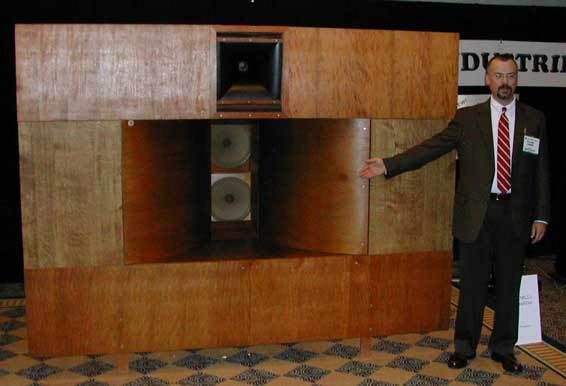Would it be the worlds largest loudspeaker?
Hi,
I am a fan of nearfield loudspeakers, because it seems best possibility for diminishing the reproduction room acoustic influence.
My thought is to build up a huge membrane, 2,70m in diagonale. Because it isnt possible for one single speaker my idea is to set up it from 1296 single speakers. The idea is described on the www.syntheticwave.de website. The wavefront should be curved by different delay time for each speaker.
How would it sound by your opinion and would it be the worlds largest speaker?
Earlybird
I am a fan of nearfield loudspeakers, because it seems best possibility for diminishing the reproduction room acoustic influence.
My thought is to build up a huge membrane, 2,70m in diagonale. Because it isnt possible for one single speaker my idea is to set up it from 1296 single speakers. The idea is described on the www.syntheticwave.de website. The wavefront should be curved by different delay time for each speaker.
How would it sound by your opinion and would it be the worlds largest speaker?
Earlybird
Post edited by Earlybird on
Comments
-
I have experience with two sets of front speakers and I can tell you that imaging is negatively impacted. I would think that you may this problem as well.
-
maximillian wrote: »I have experience with two sets of front speakers and I can tell you that imaging is negatively impacted. I would think that you may this problem as well.
The speakers was steered by the same signal? -
As long as the large speakers you are referring to are near-field and playing a stereo signal, I think it should be fine. As far as your membrane idea goes, give these a try and see what you think: Stick-On Speakers. They are made by Sonic Impact and attach to any thin membrane to produce full range sound.
Here are a couple LARGE speakers:



-
The speakers was steered by the same signal?
Yes. I have a thread about RTi6's and R50's. The combo sounds great but I can tell that imaging is poor when they are placed about a foot apart. I recently switched to stacking the 6's on the 50's and noticed that horizontal imaging greatly improved. However, there is still a vertical interference problem (comb filtering?). -
...beautiful speakers! But my spouse would be by other opinion, unfortunately.:D
The big electrostat is curved. My idea goes in that dierection. But because of my wive I must to hide the speakers behind the flat screenwall. For curving the wave fronts each speaker must guided by different signal. I have calculated the delays in a little excel. You can change the values for the virtual starting point of the wavefronts: http://www.syntheticwave.de/Download/Speakerfield.xls
By that approach woud be realised the acoustic curtain principle:
http://www.syntheticwave.de/acoustic%20curtain.htm
That would avoid the problems, mentioned by maximillian. Its huge effort, I admit. But change the wive wouldn't be less expensiv.:D -
maximillian wrote: »Yes. I have a thread about RTi6's and R50's. The combo sounds great but I can tell that imaging is poor when they are placed about a foot apart. I recently switched to stacking the 6's on the 50's and noticed that horizontal imaging greatly improved. However, there is still a vertical interference problem (comb filtering?).
...interference problems are not avoidable for two same signal loudspeakers, as far as the distance of each regarding your ears isn't absolutely even. Ony in that case all signals would be adding up. In other case effacements arise dependend of wave length; firstly in the high frequencies, but for 17 cm difference in the ways the notch goes down to 1 kHz!


